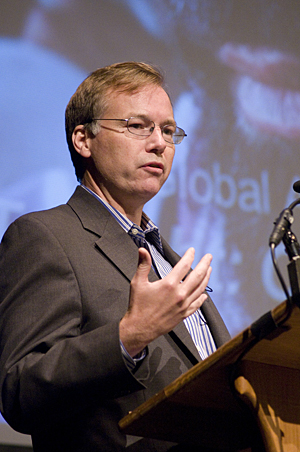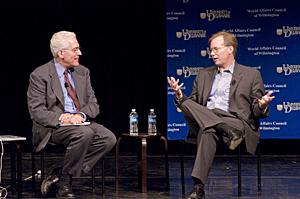

ADVERTISEMENT
- Rozovsky wins prestigious NSF Early Career Award
- UD students meet alumni, experience 'closing bell' at NYSE
- Newark Police seek assistance in identifying suspects in robbery
- Rivlin says bipartisan budget action, stronger budget rules key to reversing debt
- Stink bugs shouldn't pose problem until late summer
- Gao to honor Placido Domingo in Washington performance
- Adopt-A-Highway project keeps Lewes road clean
- WVUD's Radiothon fundraiser runs April 1-10
- W.D. Snodgrass Symposium to honor Pulitzer winner
- New guide helps cancer patients manage symptoms
- UD in the News, March 25, 2011
- For the Record, March 25, 2011
- Public opinion expert discusses world views of U.S. in Global Agenda series
- Congressional delegation, dean laud Center for Community Research and Service program
- Center for Political Communication sets symposium on politics, entertainment
- Students work to raise funds, awareness of domestic violence
- Equestrian team wins regional championship in Western riding
- Markell, Harker stress importance of agriculture to Delaware's economy
- Carol A. Ammon MBA Case Competition winners announced
- Prof presents blood-clotting studies at Gordon Research Conference
- Sexual Assault Awareness Month events, programs announced
- Stay connected with Sea Grant, CEOE e-newsletter
- A message to UD regarding the tragedy in Japan
- More News >>
- March 31-May 14: REP stages Neil Simon's 'The Good Doctor'
- April 2: Newark plans annual 'wine and dine'
- April 5: Expert perspective on U.S. health care
- April 5: Comedian Ace Guillen to visit Scrounge
- April 6, May 4: School of Nursing sponsors research lecture series
- April 6-May 4: Confucius Institute presents Chinese Film Series on Wednesdays
- April 6: IPCC's Pachauri to discuss sustainable development in DENIN Dialogue Series
- April 7: 'WVUDstock' radiothon concert announced
- April 8: English Language Institute presents 'Arts in Translation'
- April 9: Green and Healthy Living Expo planned at The Bob
- April 9: Center for Political Communication to host Onion editor
- April 10: Alumni Easter Egg-stravaganza planned
- April 11: CDS session to focus on visual assistive technologies
- April 12: T.J. Stiles to speak at UDLA annual dinner
- April 15, 16: Annual UD push lawnmower tune-up scheduled
- April 15, 16: Master Players series presents iMusic 4, China Magpie
- April 15, 16: Delaware Symphony, UD chorus to perform Mahler work
- April 18: Former NFL Coach Bill Cowher featured in UD Speaks
- April 21-24: Sesame Street Live brings Elmo and friends to The Bob
- April 30: Save the date for Ag Day 2011 at UD
- April 30: Symposium to consider 'Frontiers at the Chemistry-Biology Interface'
- April 30-May 1: Relay for Life set at Delaware Field House
- May 4: Delaware Membrane Protein Symposium announced
- May 5: Northwestern University's Leon Keer to deliver Kerr lecture
- May 7: Women's volleyball team to host second annual Spring Fling
- Through May 3: SPPA announces speakers for 10th annual lecture series
- Through May 4: Global Agenda sees U.S. through others' eyes; World Bank president to speak
- Through May 4: 'Research on Race, Ethnicity, Culture' topic of series
- Through May 9: Black American Studies announces lecture series
- Through May 11: 'Challenges in Jewish Culture' lecture series announced
- Through May 11: Area Studies research featured in speaker series
- Through June 5: 'Andy Warhol: Behind the Camera' on view in Old College Gallery
- Through July 15: 'Bodyscapes' on view at Mechanical Hall Gallery
- More What's Happening >>
- UD calendar >>
- Middle States evaluation team on campus April 5
- Phipps named HR Liaison of the Quarter
- Senior wins iPad for participating in assessment study
- April 19: Procurement Services schedules information sessions
- UD Bookstore announces spring break hours
- HealthyU Wellness Program encourages employees to 'Step into Spring'
- April 8-29: Faculty roundtable series considers student engagement
- GRE is changing; learn more at April 15 info session
- April 30: UD Evening with Blue Rocks set for employees
- Morris Library to be open 24/7 during final exams
- More Campus FYI >>
3:46 p.m., May 13, 2010----Steve Coll, Pulitzer Prize-winning journalist and author, discussed “Osama Bin Laden's Legacy” during the final Global Agenda 2010 presentation of the spring semester on Wednesday evening, May 12, in the University of Delaware's Mitchell Hall.
The theme of the spring series was “Understanding Political Islam,” and Coll provided background on Bin Laden, his family and his radicalization. He also discussed Bin Laden's use of modern communications technologies in building his terrorist network and the “branding” of Al-Qaeda.
Coll, who is president of the New America Foundation and a staff writer at The New Yorker magazine, explained that he began covering Bin Laden when he worked in Afghanistan and Pakistan as the Washington Post's foreign correspondent in the late 1980s. He wrote his first newspaper article about Bin Laden in the summer of 1993.
“I've been chronicling him as his biographer for 17 years and I think at this stage we're both pretty tired of each other,” Coll said.
Offering a brief history of Bin Laden's family, Coll said Osama had an incredibly wealthy father who came by his money as a “self-made businessman who earned one of the largest fortunes in Saudi Arabia in the construction business.”
Discussing Bin Laden's foray into the world of terrorism, Coll said he first became indoctrinated into a radical way of thinking by his physical education teacher after school.
Coll was quick to add that it is important to keep in mind that Bin Laden's “experience of political Islam, his embrace of the Muslim Brotherhood, even his indoctrination by this physical education teacher, was entirely orthodox. Imagine for this generation of college students, how their families would feel about them if they, through their church or through a secular group, decided to take a semester off and volunteer in Haiti, or take a semester off and volunteer in New Orleans after Katrina. Well, when Osama went off to Afghanistan to join the war, that's how his family saw him, that's how his community saw him -- he was doing something righteous, he brought pride to the village.”
Coll continued, “We keep asking where did he become radicalized? Well, this pathway was orthodox, it was authorized, and it provided business benefits to the Bin Laden family. So my larger point is that the story of his radicalization has to be understood in the context of the story of his orthodoxy of the structure from which he arose, and the family from which he arose.”
What made Al-Qaeda successful in becoming a “global terror brand,” where other terrorist organizations had failed, was the fact that Bin Laden was a skilled leader who embraced diversity, Coll said. “Bin Laden was, and remains, an extraordinarily talented leader of diversity -- I mean racial diversity, diversity of a language group, ethnic diversity.”
Coll attributed that trait to Bin Laden's father, who would employ both religious and secular people from various countries to work on construction projects. “The example of a global community, united in its diversity through Islamic faith, that was what the Bin Ladens built themselves around,” he said. “So this ability to rise above national origins, language groups, race -- that's one thing that distinguishes Osama from many of the other leaders around him who end up getting bogged down in really narrow arguments over race and national agendas.”
Coll added that Bin Laden had success with Al-Qaeda because of his ability to recognize how new technologies would make borders irrelevant and allow him to plan attacks in places all over the globe from his hideouts in Afghanistan.
The final point Coll drove home about Al-Qaeda's success was the fact that it is a very accomplished brand. “The Bin Ladens were a business family and all of the sons in their 20s worked as marketers, building brands,” he said, noting that even today Bin Laden's own son runs an advertising company, which is operated next to a Starbucks and a bodybuilding shop.
Coll said the name Al-Qaeda creates value, and that other terrorist groups are naming themselves Al-Qaeda in order to reap the benefits that go along with being associated with such a nefarious terrorist organization.
Al-Qaeda is resilient militarily, Coll said, but is failing politically. “It has promised change and it has delivered violence,” he said, noting that in some ways we are fortunate because “Al-Qaeda has defeated itself.”
He offered a word of caution, however, because “Osama continues to inspire individuals. That they're a minority is no comfort when they carry out violence of a certain scale.”
The 2010 Global Agenda Speaker Series is sponsored by the UD Center for Political Communication and presented by the World Affairs Council of Wilmington, the UD Institute for Global Studies, the Department of Communication and the Department of Political Science and International Relations.
The series is moderated by Ralph Begleiter, director of UD's Center for Political Communication.
Article by Adam Thomas
Photos by Duane Perry


